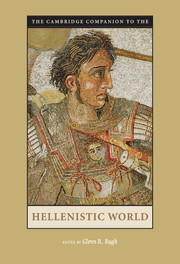Book contents
- Frontmatter
- Introduction
- 1 Alexander the Great and the Creation of the Hellenistic Age
- 2 The Hellenistic Kingdoms
- 3 The Polis and Federalism
- 4 Hellenistic Economies
- 5 The Hellenistic Family
- 6 History and Rhetoric
- 7 Material Culture
- 8 Hellenistic Art: Two Dozen Innovations
- 9 Language and Literature
- 10 Greek Religion: Continuity and Change in the Hellenistic Period
- 11 Philosophy for Life
- 12 Science, Medicine, and Technology
- 13 Hellenistic Military Developments
- 14 Greeks and Non-Greeks
- 15 Recent Trends and New Directions
- Hellenistic Dynasties
- Works Cited
- Index
3 - The Polis and Federalism
Published online by Cambridge University Press: 28 November 2007
- Frontmatter
- Introduction
- 1 Alexander the Great and the Creation of the Hellenistic Age
- 2 The Hellenistic Kingdoms
- 3 The Polis and Federalism
- 4 Hellenistic Economies
- 5 The Hellenistic Family
- 6 History and Rhetoric
- 7 Material Culture
- 8 Hellenistic Art: Two Dozen Innovations
- 9 Language and Literature
- 10 Greek Religion: Continuity and Change in the Hellenistic Period
- 11 Philosophy for Life
- 12 Science, Medicine, and Technology
- 13 Hellenistic Military Developments
- 14 Greeks and Non-Greeks
- 15 Recent Trends and New Directions
- Hellenistic Dynasties
- Works Cited
- Index
Summary
The Polis in the Classical Period and After
Classical Hellas - both Old Greece and the wider world of Hellenic colonies in the Mediterranean and Black Seas - has often been called “a world of cities” and with good reason. The polis (city-state; plural poleis) was one of the central institutions of Greek society. Yet, modern historians have sometimes claimed that there was a fundamental change in the Hellenistic period. It has even been asserted that “the” polis ceased to exist - perhaps at the battle of Chaironeia (338), at the end of the Lamian war (321), at some point during the wars of the Successors (323-281), at the end of the Chremonidean war (ca. 262), or after the defeat of the Achaian league by Rome (146).
In the face of these rather black-and-white views, recent scholarship has taken a different line. Greek cities, as physical and social entities, patently remained in use and continued to be built throughout the Hellenistic period and beyond. More importantly, the social entity that was the classical polis did not lose all its defining features. Rather, it was transformed in practice. As a model, or concept, of social organization, its components were modified in different ways at different times.
- Type
- Chapter
- Information
- The Cambridge Companion to the Hellenistic World , pp. 52 - 72Publisher: Cambridge University PressPrint publication year: 2006
- 7
- Cited by



